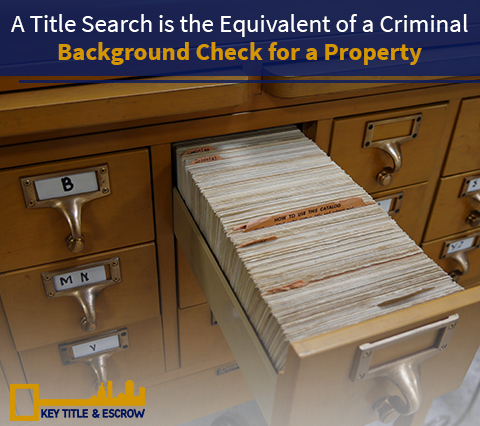The 27 Most Common Questions People Ask Title and Escrow Service Providers in Florida
August 09, 2017
 Buying a home involves a lot of people and paperwork and it's normal for many questions to arise throughout the process. Below you will find the answers to the most frequently asked questions we get from our satisfied customers.
Buying a home involves a lot of people and paperwork and it's normal for many questions to arise throughout the process. Below you will find the answers to the most frequently asked questions we get from our satisfied customers.About Title Insurance
- What is title insurance?
In a real estate transaction, title insurance is a policy that protects both the lender and the buyer against any potential loss derived from problems related to the property's title. A title insurance policy covers the insured party for any claims and legal fees that might result from problems with the title. - Who chooses the title company?
The person paying for the insurance is the one who chooses the title company. That is, if the seller is expected to pay for title insurance, they have the right to select the title agency; and if the buyer is the one paying for it, then it is their right to choose.
Title insurance is different from other types of insurance policies because it protects the insured party against past problems, rather than future problems. You also just have to pay a one-time premium. - Do I need title insurance?
Title insurance is something that buyers should have when purchasing a property. This is to prevent the buyer's ownership from being compromised by undisclosed or undiscovered title defects that might surface in the future.
There is nothing that states it is mandatory to purchase title insurance. However, most lending institutions require it in order to grant the mortgage; plus, real estate professionals highly recommend it. - How much does title insurance cost?
Florida title insurance probably costs less than what you think. The rates of title insurance policies in Florida are set by the state's Office of Insurance Regulation and they can be found here.
The premium for title insurance is a one-time fee that is worked up taking the purchase price into consideration.
The search and closing fees are separate from the title insurance company and they can vary from one company to another, that is why Florida's Chief Financial Officer's guide to title insurance recommends that buyers shop around and compare fees before deciding which title agent they want to deal with. - Is title insurance paid annually?
No, title insurance fees are paid once, usually during the closing. - Who pays for the title insurance policy?
The party responsible to pay for the title insurance policy is decided during contract negotiations. In most Floridian counties, it is the seller who pays for title insurance.
However, the "customary" approach varies from county to county. For example, in Miami-Dade and Broward counties, the seller is responsible for paying for the title search while the buyer is expected to buy their title insurance policy. In other counties such as Palm Beach, the seller usually pays for both.
Buying a home involves a lot of people and paperwork and it's normal for many questions to arise throughout the process. Below you will find the answers to the most frequently asked questions we get from our satisfied customers. - What sort of claims does a title insurance policy cover against?
Title insurance protects the buyer and/or the lender from title defects or claims that others may have to the property. It also protects the buyer from any outstanding debts of previous owners.
What the policy covers shoud be clearly stated within the terms but, generally speaking, title insurance policies cover any undiscovered defects or claims that appear once a thorough title search has been carried out. This might include forged signatures, unpaid real estate taxes, as well as other types of liens and encumbrances. - How much could I lose if a claim is filed against my property?
Loss can depend on many factors. Even if it's a small claim or there are no grounds for it, it will cost time and legal fees.
In the most extreme of situations, you could lose the entire property and yet be legally responsible to pay the loan you took out to buy it. However, this is rarely the case. - How does title insurance protect my investment in case of a claim?
If the claim has grounds and a judge rules against the buyer, the insurance issuer will compensate the loss up to the amount stated on the policy.
Additional to the claim or claims, the policy should cover the legal fees associated with any litigation derived from the issue. - Are there different types of title insurance policies?
Yes, there are two types of title insurance—the lender's policy and the owner's policy.
A lender's policy is required my many lending institutions to secure their interest in the transaction. A lender's policy is valid until the mortgage granted to buy the house is paid in full.
An owner's policy, on the other hand, provides protection to the person or persons who purchase the house against unforeseen title defects or clouds that might arise once the title has been transferred. - How long does my coverage last?
That depends on the type of policy. A buyer's policy lasts as long as the policy holder owns the property, and sometimes it can extend to property heirs. A lender's policy expires once the mortgage has been paid in full. - What is a title search?
A title search is the equivalent of a criminal background check for a property. It is an assessment of the historical record of a given property.
The title search examines deeds, court records, the existence of unresolved liens, recorded code violations, restrictions of use, easements, any judgment that might have been filed against the title, or any other burden.
This is done to make sure that the seller has the right to transfer the property to a third party.
The title agent carries out a thorough research in the county records to discover if there are any problems with the title that might jeopardize the buyer's future ownership. - What kind of problems can a title search reveal?
Depending on how long ago the property was built and how many owners it has had over the years, its record could be clean or clouded. Some of the defects a title search can unearth are unknown liens, easements or wills; errors in the public records, boundary disputes, illegal deeds, false impersonation, unsatisfied mortgages, and more.

- Are there any problems that a title search cannot reveal?
Yes. Even if the title agent carries out a thorough title search, there are still issues that are not so easy to discover. Some examples of these problems that might jeopardize property ownership are: incorrect name spellings, confusions due to similar names, clerical mistakes, stating the wrong marital status, claims not filed in the recordation office, undiscovered heirs, ownership of easement rights, etc. - Why do I need title insurance if the builder of my home already has title insurance on the property?
A title insurance policy issued to the builder does not protect buyers. - Why is transferring a real estate title different from other types of property?
This is due to 2 main factors:- A piece of land could have had many different owners before you (even if nothing has ever been built on it).
- Others might have additional rights over the property without necessarily owning it (mineral, air, utility rights, or easements).
- My lender had me buy title insurance for them when I took out my mortgage. Does their policy cover me too?
No, as we explained before, there are two types of policy and each should be taken separately. - How long does it take to verify that a title is clear?
The title search and evaluation can take around 48 hours. However, if there are any problems with it that are revealed, it can take additional time to determine whether the title can be cleared before closing. - If I'm buying a brand-new house, do I still need title insurance?
Even if you are buying a brand-new house, it is advisable that you get a title insurance policy. Why? There could be problems related to the land ownership of where the house is built. There can be mechanic liens attached by contractors who have not been paid in full for their services.
Another example of a potential issue is a piece of land that was previously owned by several people and was sold to the developer without the consent of one or more of the partial owners. In such a case, they can file a claim against the property.
About Escrow Services
- What is an escrow account?
In the context of real estate transactions, an escrow account is an account held by a third, neutral party where everything pertaining the purchase-selling of the house is deposited. This includes money and deeds, as well as other documents. - What is an escrow agreement?
An escrow agreement is a document that contains and explains the terms and conditions that the parties involved in the transaction need to fulfill and how.
In the case of real estate, a buyer puts their earnest deposit in an escrow account while the seller provides the property title and other documents relevant to the transaction when the purchase agreement is signed. The escrow agent manages the escrow account. - What does the escrow agent do?
An escrow agent is either a person or an entity. They hold all relevant documents and funds in an account while all interested parties comply with their part of the purchase agreement.
About Closing the Purchase
- What should I bring to the closing?
Depending on the type of property, the terms of your purchase agreement and loan, and state and local closing customs and rules, you should bring: photo identification, funds, separation agreement or divorce order (if you've been married and are in the process of getting a divorce), documentary or transfer stamps, along with any other document requested within the terms of the agreement signed.
We advise you to make a checklist with all of these documents. Ask your realtor or escrow agent if you have everything you need before the closing date. That way you won't experience delays because of missing documents. - How long will the closing process take?
Typically, real estate transactions can take between 30 to 45 days to close. - What should I expect at the closing?
Closings usually take place at the title and escrow company; the seller, the buyer, the real estate agents, and each party's lawyer should be there along with the closing agent, the title agent, and the escrow agent, which in many cases are one company.
In order to transfer the property's ownership, all legal documents need to be signed. Among these documents, we can mention the Truth in Lending statement, the closing statement, the deed of trust, the mortgage note, affidavits from both seller and buyer. There might be some other documents depending on the nature of the transaction.
The buyer gives the seller a check for the proper amount, the seller signs the transfer paper, the title company registers the new deed and lists the buyer as the new owner, closing costs are paid and the seller receives the earnest money held in the escrow account. - What is a statement of information?
The statement of information is used to avoid mistaking the interested party for others with similar names. Documents such as tax liens, judgments, bankruptcies, and others can be indexed by name and not with the property's information. Regardless, these matters can affect the land and jeopardize property ownership in the future.
The statement of information helps the title agent rule out issues of public record that may come up because of name similarities. - How much money will I need for escrow at closing?
The amount of money needed for closing will be available when the loan documents are available and the escrow agreement drafted. You or your agent will be contacted by the title company to be informed on this amount.









